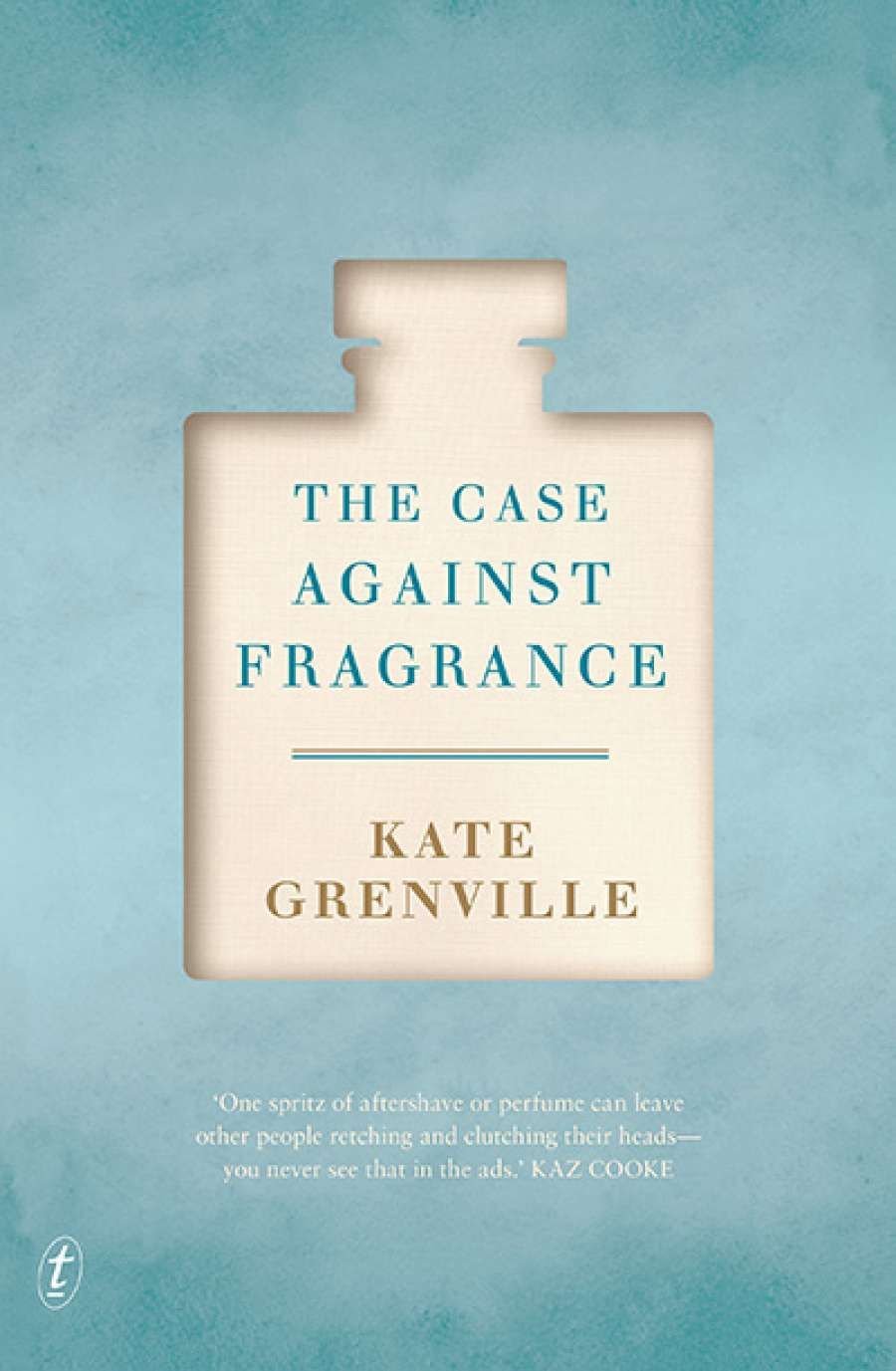
- Free Article: No
- Contents Category: Memoir
- Custom Article Title: Diana Bagnall reviews 'The Case Against Fragrance' by Kate Grenville
- Review Article: Yes
- Online Only: No
- Custom Highlight Text:
Kate Grenville’s publisher wasn’t keen on her writing a book about fragrance. He would have preferred another novel from the author of ...
- Book 1 Title: The Case Against Fragrance
- Book 1 Biblio: Text Publishing $24.99 pb, 208 pp, 9781925355956
Fragrance in Grenville’s lexicon is not quite the same as perfume. As I understand the distinction, fragrance is to perfume as muzak is to music: its signature notes are bland, but it is ubiquitous and invasive. Although Grenville introduces her complaint against fragrance with lively sallies against the heavy-handed perfuming habits of individuals she encounters in bookshops and concert halls, the main thrust of her case is levelled against the addition of fragrance to everyday products in industrial quantities – what you might call the ‘fragranced toilet paper’ syndrome. The typical woman, she suggests, is exposed to fragrance in myriad products before she leaves the house. Beyond it she will encounter fragrance in shops and offices, taxis and buses, hotels and airports. She arrives home with second-hand scent on her clothes, in her hair, on her skin.
The prime fragrance villains include air ‘fresheners’ of various descriptions, cosmetics, cleaning products, hair products, scented candles, and so on. Consider also the humble laundry powder which, as Grenville points out, scents the fabric we daily put against our skin in conditions of heat and moisture, ‘the perfect environment for the maximum absorption of fragrance chemicals’. We live in a ‘permanent mist of scented air’, she writes. (I’m old enough to remember another ‘permanent mist’, namely cigarette smoke, and to draw the obvious parallels.)
Grenville follows the fragrance trail with a tenacity and diligence that would do an investigative journalism team proud, though her research was not propelled by any kind of professional urge, she tells the reader. She was just a novelist with a headache who, one night, alone and desperate in a Hobart hotel room, did what any of us might do – consulted Google. ‘I felt as if I’d innocently pushed open a door that I hoped would provide the answer to a simple question: why do I get headaches from fragrance? It had instead revealed a dark and dangerous landscape.’ Then she went exploring and found much to report from the scientific front, less so from the industrial and regulatory fronts.
Three large US studies conducted between 2004 and 2016 reported adverse reactions to scented products in about one-third of respondents. Research into the harm that undisclosed combinations of hundreds of fragrance chemicals inflicts on the human body, both cumulatively and interactively, is as new as research into smoking was fifty years ago. Already, fragrance is implicated in health conditions like asthma, allergies, and migraines; it is also a suspect in more complex hormonal and carcinogenic scenarios. Yet there is little information available on the materials used in fragrance, and little governmental regulation of the industry. In her darker moments, Grenville posits that the fragranced world we live in is ‘in the nature of an experiment, with humans are the lab rats’.
 Kate Grenville (photograph by Darren James)
Kate Grenville (photograph by Darren James)
Some may conclude that Grenville doth protest too much, but her claims are amply backed up in an extensive notes section. She is not prone to overstatement; when she stretches the point she is open about doing so. Her tone is that of rational enquiry rather than persuasion. She aims to ‘balance things out’. Inevitably, this quest involves a discussion of competing rights. Grenville expresses hope though that our society will find solutions to the fragrant violation of personal space based on courtesy and civility rather than on regulation and policy. History would suggest otherwise.
In 2008, a Detroit city planner who was having trouble breathing in her open-plan office asked her employers to implement a low-scent policy. They refused. One day she collapsed and was hospitalised. She was unable to return to work. A court awarded her US$100,000 compensation for her allergy. Many workplaces in the United States and Canada now have low-scent or fragrance-free policies. A similar claim filed in Australia in 2014 failed, but Grenville notes the claimant could not afford a lawyer.
Case far from dismissed.


Comments powered by CComment